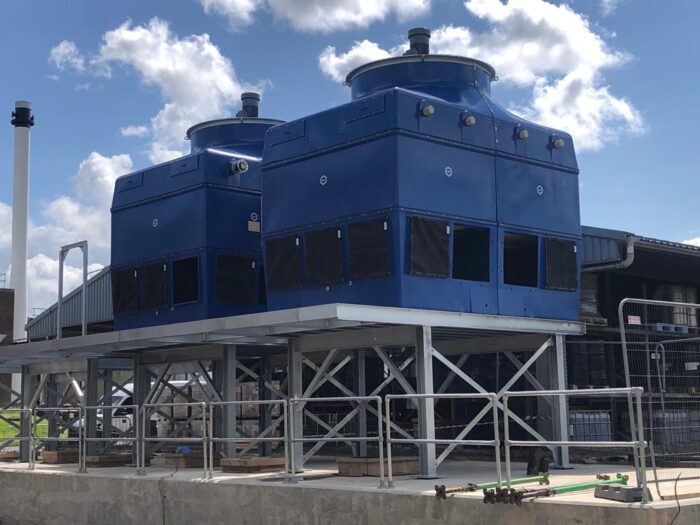
As UK businesses increasingly prioritise sustainability and operational efficiency, the need to rethink and upgrade legacy cooling systems has never been more urgent. Outdated cooling technologies—once the backbone of industrial operations—are now hindering progress, driving up energy consumption, and failing to meet modern environmental standards. In today’s competitive landscape, continuing to rely on these legacy systems can not only limit a company’s sustainability goals but also result in escalating operational costs. We discuss why upgrading legacy cooling systems is essential for reducing costs, lowering environmental impact, and ensuring long-term operational efficiency.
The Urgency of Overhauling Legacy Cooling Systems
In many UK industries, cooling systems are essential for maintaining operations, but the legacy systems many businesses rely on today are becoming increasingly unsustainable. According to a recent article published by Power Engineering International, “Why the UK’s Cooling Systems are Hindering Industrial Competitiveness,” many industries continue to use outdated cooling technologies that consume excessive amounts of energy and water. These systems were originally designed to meet older, less demanding operational needs. However, they are now contributing to inflated energy costs, environmental harm, and lower industrial competitiveness.
British businesses have long fallen behind their competitors, with many cooling systems across the country no longer fit for purpose.
Legacy cooling systems are inefficient in several ways. First, they typically use more energy than newer technologies, contributing to higher operational costs. Second, many legacy systems are not built to meet modern environmental standards, making it difficult for companies to reduce their carbon footprint and comply with stricter regulations. Finally, they often use more water than necessary, adding to water scarcity concerns in areas already facing stress on water resources.
The article also points out that legacy cooling technologies hinder UK industrial competitiveness by locking companies into outdated infrastructure. In an era where sustainability is a key competitive differentiator, continuing to rely on inefficient systems could be costing our UK industries both financially and environmentally. To stay ahead, companies must modernise their cooling systems to meet the growing demands of efficiency and environmental responsibility.
Only 12% of UK manufacturers have made improvements to industrial processes to boost their energy efficiency
Department for Energy Security & Net Zero
The Case for Sustainable Cooling Solutions
Modern cooling technologies, particularly evaporative cooling systems, offer a viable solution to the challenges posed by legacy systems. Unlike dry cooling solutions, which rely on air to dissipate heat, evaporative cooling towers use water to cool air through evaporation. This approach significantly reduces energy consumption, uses water more efficiently, and has a much lower carbon footprint. As demonstrated in a study by Eurovent, a leading European indoor climate and process cooling association, evaporative cooling systems consistently emit less CO2 compared to traditional dry cooling technologies.
The transition to evaporative cooling systems is part of a broader trend towards sustainable, eco-friendly technologies in industrial cooling. These systems not only reduce carbon emissions but also have a smaller environmental impact overall, making them a key component of any company’s sustainability strategy.
Real-Time Monitoring and Tailored Solutions
One of the first steps in overhauling legacy cooling systems is to conduct a thorough real-time monitoring assessment. This involves evaluating the current performance of your cooling system to understand its energy and water consumption, efficiency, and overall environmental impact. With this data, businesses can identify inefficiencies and pinpoint areas where improvements are needed.
In many cases, legacy systems may still be operational, but their inefficiencies are costing businesses more in terms of energy, maintenance, and water use than would be required to upgrade to a more efficient system. Real-time monitoring ensures that any new system implemented is tailored to meet the specific operational demands of a business, eliminating excess consumption of power and water.
Reducing Carbon Footprints and Achieving Sustainability Goals
A key driver for upgrading legacy cooling systems is the ability to significantly reduce a company’s carbon footprint. As industries around the world work toward achieving Net Zero emissions, it’s becoming clear that upgrading outdated technologies is essential for meeting sustainability targets. Modern evaporative cooling solutions, for example, are among the most energy-efficient methods of cooling, with their ability to lower CO2 emissions making them an attractive option for businesses looking to cut their environmental impact.
The Eurovent study highlights that evaporative cooling technologies offer the lowest year-round carbon footprint compared to dry cooling methods. As companies face increasing pressure to meet environmental regulations and goals, transitioning to these systems can make a significant difference in reducing overall emissions and supporting global climate objectives.
The Financial and Environmental Benefits of Modernisation
Upgrading legacy cooling systems offers significant financial benefits in addition to environmental advantages. Many companies that choose to modernise their cooling infrastructure see immediate cost savings in energy consumption, maintenance, and operational efficiency. Newer cooling technologies are generally more durable and require less frequent repairs, reducing downtime and maintenance expenses over time.
Furthermore, modern cooling systems often align with global regulatory standards and sustainability certifications, which can help businesses improve their environmental credentials and strengthen their market position. Companies that adopt eco-friendly technologies are increasingly seen as leaders in their industries, both for their commitment to sustainability and for their ability to operate efficiently and competitively.
Ensuring Long-Term Sustainability and Competitiveness
Overhauling legacy cooling systems is not just a one-time upgrade; it is part of a broader effort to ensure long-term sustainability and operational resilience. As industries face increasing regulatory pressure and the economic imperatives of climate change, investing in efficient, environmentally responsible cooling technologies is essential. By upgrading to systems that use less energy, consume less water, and produce fewer emissions, companies are positioning themselves for long-term success in a world where sustainability is no longer optional—it’s essential.
Modern cooling systems, such as evaporative cooling towers, are engineered for performance, sustainability, and cost-effectiveness. By transitioning away from outdated technologies, UK businesses can reduce their environmental impact, cut operational costs, and help achieve global sustainability targets, all while ensuring reliable, efficient cooling for their operations.
Richard Crunden, Managing Director, Vistech Cooling Systems Ltd
